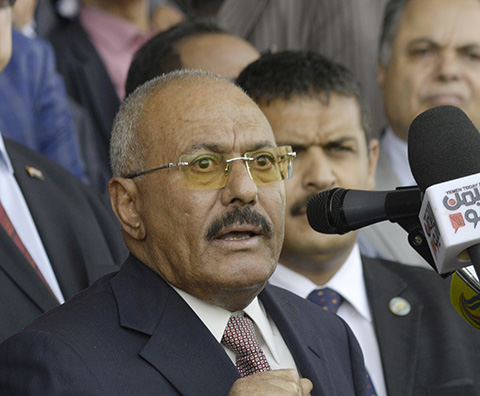 SANNA: In this file photo, former Yemeni President Ali Abdullah Saleh speaks during a ceremony in Sanaa, Yemen. - AFP
SANNA: In this file photo, former Yemeni President Ali Abdullah Saleh speaks during a ceremony in Sanaa, Yemen. - AFP
SANAA: Yemen's Houthi rebels claimed today that ex-president Ali Abdullah Saleh had been killed as fighting shook the capital Sanaa following the collapse of his alliance with the insurgents. The claim, which could not be independently confirmed, came as Yemen's long and devastating civil war took a potentially decisive turn. Heavy clashes were reported in the city between forces loyal to Saleh and the Iran-backed Shiite rebels, who together seized control of Sanaa from the internationally recognized government three years ago.
Moving to take advantage of the chaos, President Abedrabbo Mansour Hadi, whose government is backed by a Saudi-led military coalition, ordered his forces to advance on the capital. The Houthi-controlled interior ministry announced Saleh's death on the rebels' Al-Masirah television station. A statement read on the channel announced the "end of the crisis of militias", referring to Saleh's armed supporters, and "the killing of their leader and a number of his criminal supporters". A video given to AFP by the rebels showed what appeared to be a dead Saleh with a severe head injury, his body wrapped in a floral-print blanket.
An AFP photographer who approached Saleh's home in southern Sanaa today found it in the hands of the Houthis and was prevented from entering. The house appeared to have been damaged in fighting. The alliance between Saleh, who ruled Yemen for more than three decades before resigning in 2012, unraveled over the past week, with at least 100 people reported dead in fighting, accusations of betrayal and the former leader reaching out to the Saudi-led coalition.
Heavy fighting in Sanaa
As witnesses reported continued heavy fighting today, Hadi ordered his forces to launch an offensive to advance on the capital. "The president has ordered Vice President Ali Mohsen al-Ahmar, who is in Marib (east of Sanaa), to activate military units and advance towards the capital," a presidency official told AFP, speaking on condition of anonymity. The government also reached out to Saleh's supporters with an offer of amnesty.
"The president will soon announce a general amnesty for all those who collaborated with the Huthis in recent months and who have retracted that allegiance," Prime Minister Ahmad Obaid bin Daghr said. The Saleh-Huthi alliance had been fraught since its inception in 2014, when the two ended decades of enmity and joined ranks to capture Sanaa from Hadi's government. Saudi Arabia, accusing arch-rival Iran of backing the rebels, intervened in the Yemen war on behalf of the government the following year.
Sanaa has been hit with air strikes for months, and a fresh wave today targeted areas near Sanaa International Airport and the interior ministry, both under Huthi control, residents and an airport source said. The coalition today warned Yemeni civilians to avoid rebel areas. "The coalition urges civilians to evacuate areas near positions held by the Houthis," read a statement published by Saudi Arabia's state-run Al-Ekhbariya TV. "We ask civilians to remain at least 500 meters away from Houthi military vehicles and gatherings." Residents near the airport said multiple air raids had shaken their homes late yesterday night and early today.
Fears for civilians
An airport source said rebel bases near the location appeared to have been targeted, but the airport itself had not been bombed. Residents reported that the fighting, which erupted Wednesday, had spread outside the capital. Tribal sources in Saleh's hometown Sanhan, south of Sanaa, today reported intense overnight fighting between the Houthis and Saleh loyalists.
Witnesses said clashes had erupted around the residence of Tarek Saleh, a nephew of the former president and a leader with his forces. Saleh on Saturday announced he was open to talks with Saudi Arabia and its allies on condition they ended their crippling blockade of Yemen's ports and airports. That dealt a serious blow to his already fragile alliance with rebel chief Abdul Malik al-Houthi. The Saleh-Huthi split sparked fears of a new front in the Yemen war, which has already claimed more than 8,750 lives since the Saudi-led coalition intervened.
The conflict has pushed Yemen to the brink of mass starvation and triggered what the United Nations has called the world's worst humanitarian crisis. International aid groups warned today they were losing the ability to reach civilians in Sanaa. "Ambulances and medical teams can't access injured, people can't buy food and other supplies," UNICEF's Rajat Madhok said on Twitter. "Aid workers can't travel and implement critical life-saving programs. This latest violence couldn't come at a worse time."--AFP




